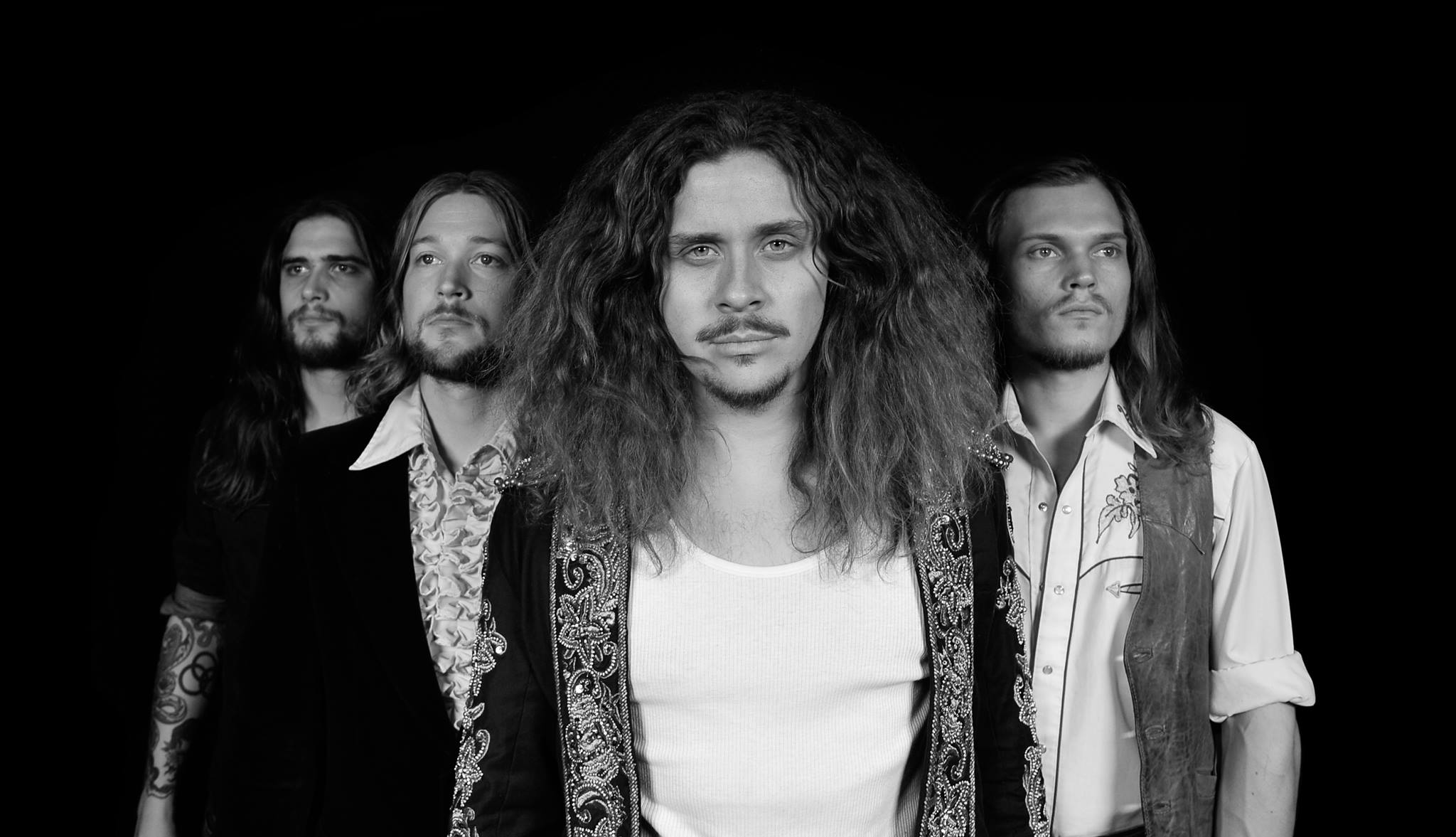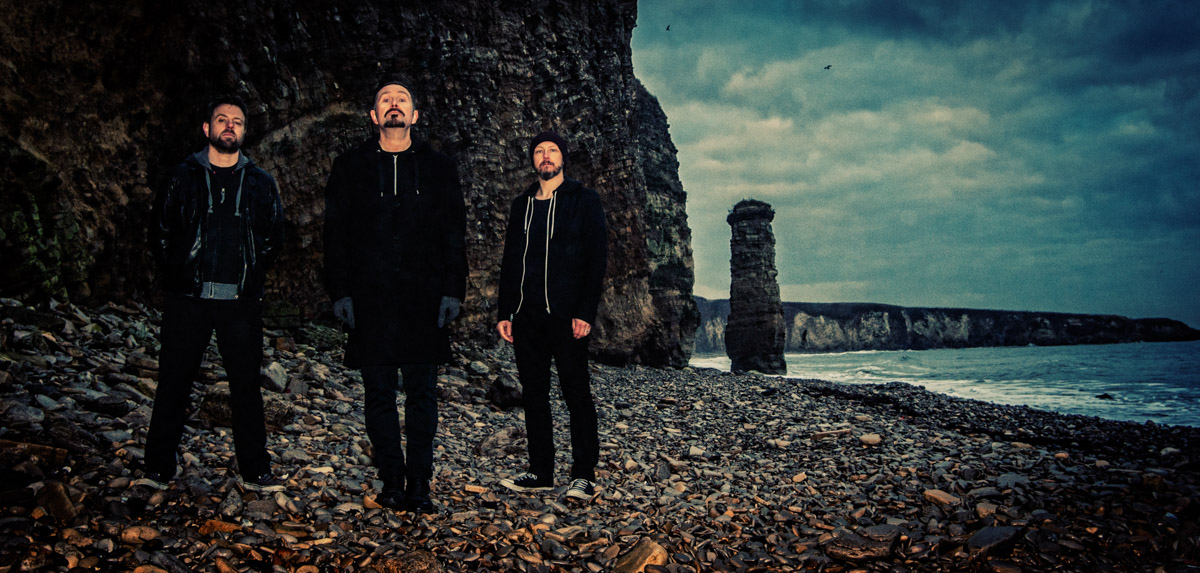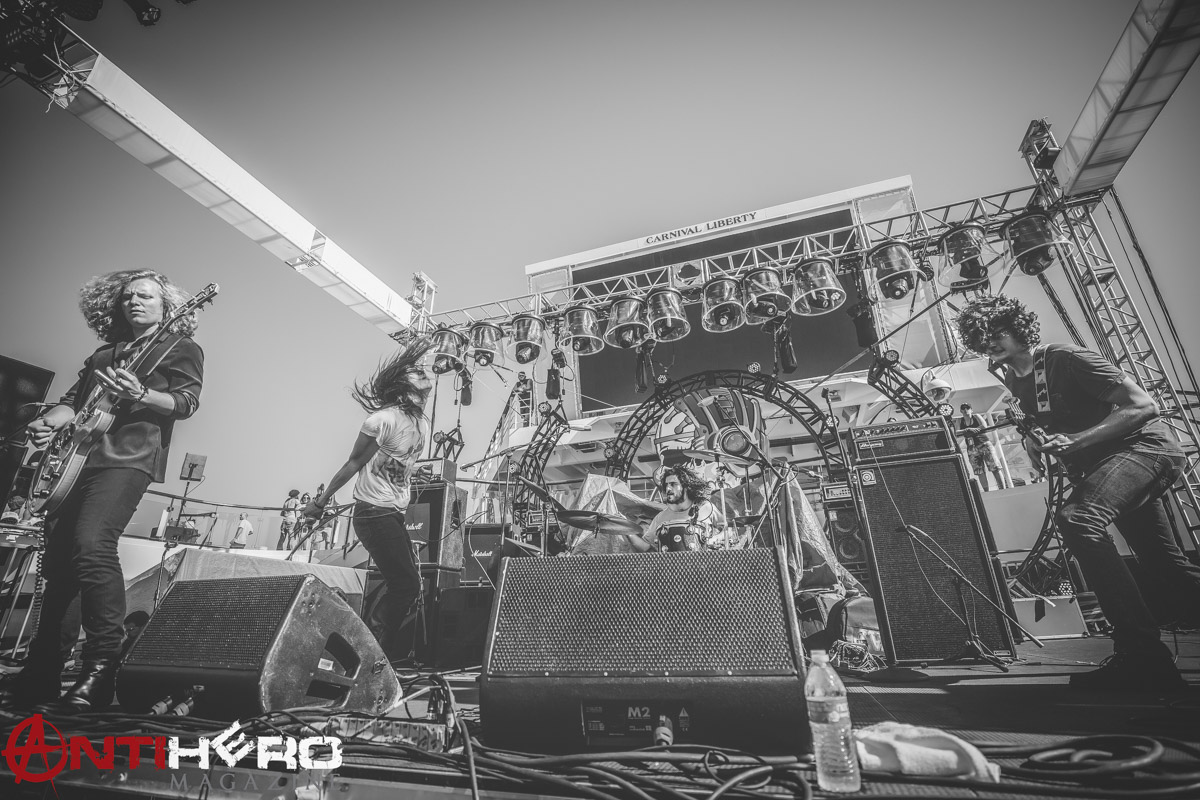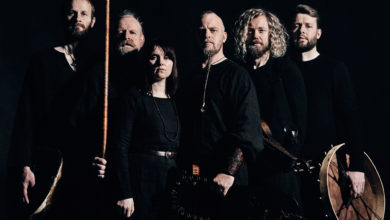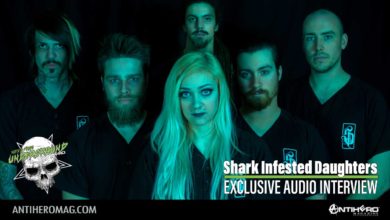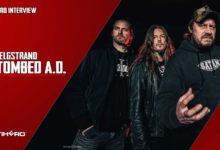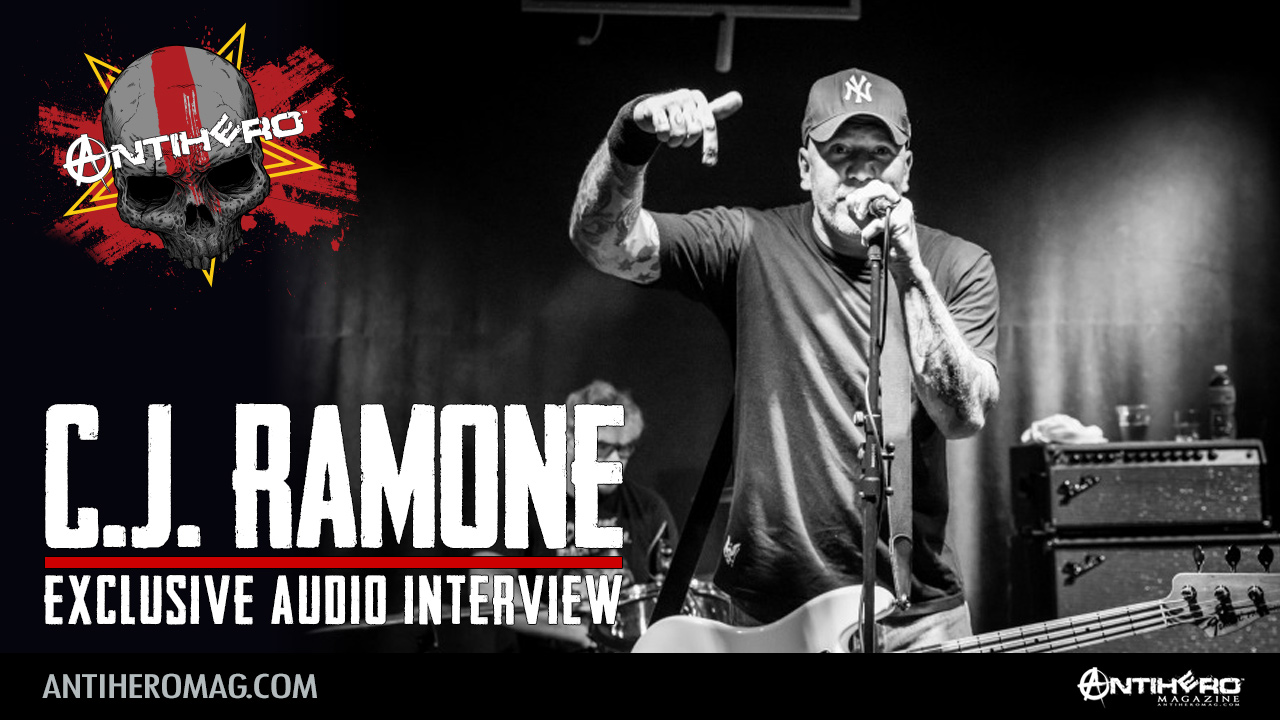Antihero Magazine recently chatted with Anders Brink, singer and guitarist of Copenhagen-based rockers SEA, about the band’s history, the underground, plans for the near future and more!
ANTIHERO: Can you just tell me a little bit how the band was started?
Anders Brink: Sure. The bass player, Maico, and I, we grew up together on a small island in Denmark, very isolated little cliff island. So, we grew up together. We’ve known each other since we were maybe 12 years old or something like that. And then we started our former band, our first band over there and played a couple of years together. And then when we left high school, we kind of needed to move away from the smaller island. So, we went to Copenhagen, the capital in Denmark and then we started up a band there. I think it was back maybe six years ago or something like that.
And then we met up with the other guys. It was actually pretty much a coincidence. We just, like the old school way, made a little piece in an internet newspaper looking for some guys. Then we met up and it was actually a perfect match. We have always been into that old school rock and old school metal. We met up with Jonas and Anders, the other two guys who had known each other for some years. And then we instantly clicked. That was nice. We had the same references and the same places we wanted to go with the music. So, that was lucky, I guess.
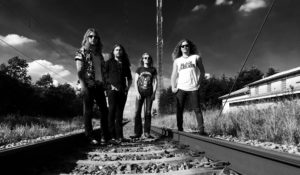 ANTIHERO: Who are your musical and non-musical influences?
ANTIHERO: Who are your musical and non-musical influences?
Anders Brink: Musical influences, we have a lot. Actually, the kind of beginning of our music taste or our style was actually Maico and I, the bass player, the island, Bornholm, we grew up on, it sounds very cliché but we found an old box of CDs. He had a bigger brother, one of our friends had a big brother who left behind a lot of CDs from the late 80s, mid-80s, late 80s, early 90s, all kinds of good stuff, Pantera and Judas Priest and Skid Row and all kinds of stuff from back then. We didn’t know any of those bands. So, that’s kind of when we got into that when we were maybe 12 or 13 years old.
And of course, our parents, they had a lot of older vinyls with Black Sabbath and Deep Purple and Uriah Heep, all the good stuff, Hendrix, Beatles, Stones and stuff like that, Creedence. So, that’s kind of where we found our bliss and found our styles from those old records. We didn’t really know what kind of music it was, but we kind of just loved it when we put it on. We had like a listening session, just took out one CD, “What is this? I don’t know.” We put it on. “I like that, I don’t like that.” We kind of went from there.
But today, actually, it’s a little different for the people in the band, I guess. Some of us are more metal and some of us are more rock or blues. Then it kind of merges into the style that we have on these two records that we made. For me, it kind of goes from what I saw yesterday, Creedence Clearwater Revival, that’s kind of like the basic good songwriting band. So, that was a lot of fun, the first time I ever saw John Fogerty. So, that was a pleasure. Then all the way up to different metal bands and stuff … I don’t know if we really see ourselves as a metal band. But we listen to a lot of different music. I know our drummer is really into a lot of death metal and stuff like that. Our guitar player, he listens to a lot of ZZ Top and stuff like that. And of course, Metallica, we have always listened to lots of Metallica. For me, it’s maybe those early 70s guys, the big three, Black Sabbath and Zeppelin and Purple. That’s kind of what I really love.
And non-musical references, I guess when you listen to the lyrics on this album, I write all the lyrics. I rarely pick up like a subject or something, a specific thing that I want to write about. It kind of just comes out. I guess it’s kind of just my views on different things on life and on politics, religion and stuff like that. I guess it’s just a blend of what’s in my head. I guess, of course, I’m influenced by all kinds of stuff, what’s going on in the news, what’s going in the world and what’s going on in my life, of course. So, it’s hard to say specifically what I’m influenced by.
ANTIHERO: Can you describe the songwriting process?
Anders Brink: The songwriting process, usually it’s either Anders, the other guitar player, or me, we come up with some riffs. That’s usually where it starts, with a riff. Then we build from there. So, the last thing that we usually do, that’s the lyrics. Of course, the vocal melody can be in place pretty early in the process. So, usually it’s some sort of hook or riff or idea and then we kind of just build the song around that. Then we bring it to the rehearsal studio and get the other guys into it and then maybe they have some ideas, maybe they have some other things and we kind of build it from there. We wrote all the songs on the record, Anders and I and then the other guys, of course, do their thing and put their twist on it. That’s usually how it goes.
ANTIHERO: How would you describe your sound? It’s kind of a retro kind of sound.
Anders Brink: Yeah. It’s a good question. We often get that retro reference, retro rock or retro band or stuff like that. Of course, I can see where people get it from. It’s pretty obvious what kind of music we like, I guess. But for me, we don’t consider ourselves a retro band. We don’t sit down and say, “We want to sound like a band from the 70s.” Not that there’s anything wrong with that, there are a lot of great bands in the 70s. So, that’s an honor to be compared to some of them. But really, it’s more like when we started together playing music, it was kind of more like look what we can do music, see how many different things we can play, more like showing off music. After a couple of years together, we kind of found out how we sound the best as a four-piece. That’s kind of the sound that we developed into.
So, it’s just the music that we want to play, I guess. It’s how we sound the best when we play this kind of music. Of course, there’s a lot of references to 70s and I guess early 80s bands and stuff like that. Actually, sometimes, a lot of times we get compared to Soundgarden and stuff like that. That’s funny because I really never listened to grunge at all. But yeah, neither of us did, actually. Our guitar player listened to Alice In Chains a little bit, but I guess that just came out of nowhere because I very rarely listen to grunge and Alice In Chains or Audioslave and bands like that … Not Audioslave but Soundgarden, of course, we are compared to a lot of times, actually.
So, sometimes, I guess, those references just come out of nowhere just from love of playing music. But yeah, I just call us a heavy rock band and that’s kind of it for me. And if people want to compare us to something, that’s great, but that’s not really how I write songs, how I consider the band, but I guess that’s kind of necessary. When you want to recommend a band to someone, the first question you ask is, “What do they sound like? Can you mention a band?” That’s a good way of describing music, I guess. But for us, it’s just how we sound. We have a lot of those retro rock bands in Scandinavia, especially Sweden. They have like Graveyard and Witchcraft and Horisont, a lot of great bands in that style. They kind of have their own sound, the Swedish retro bands. And they’ve done well for themselves. And of course, in the states you’ve got bands like Rival Sons and stuff like that.
ANTIHERO: Describe the recording process when you recorded The Grip of Time.
Anders Brink: We recorded it here in Copenhagen with a guy called Jakob Winther. Actually, we kind of wanted like a different twist on the whole metal thing because in Denmark, we have a lot of great, great metal producers or hard rock producers and they all have their own specific sound. You can kind of hear what producer it is. They really developed some very characteristic styles. That’s, of course, awesome. We did that on our first record with one of those guys called Jacob Bredahl. That was awesome, but we kind of wanted to maybe create our own sound on this record to maybe stand out a little bit.
So, we kind of chose a producer who normally doesn’t work with bands like us. He works with everything from pop artists to maybe soft rock artists and soul and stuff like that maybe to get another perspective on our music. So, that’s why we chose him in the first place. We recorded the record over a month or something here in Copenhagen. Then we got the opportunity of going to London to Abbey Road Studios to do the master because he has a collaboration with them. So, he told us, “Do you want to do the master here in Copenhagen or do you want to go to Abbey Road? I can make it happen.” We thought, “Why not? That sounds pretty amazing.” So, we all went there to Abbey Road Studios for a day and did the mastering. That was, of course, a big experience. That was amazing to walk the halls, the magical halls of rock and roll history in that amazing place and of course, to be able to listen to your own music through the Abbey Road speakers, that’s pretty cool.
ANTIHERO: Do you feel it’s important to step out of your comfort zone when it comes to your songwriting?
Anders Brink: Yeah, definitely, I do. It’s kind of that whole old thing about, “Why fix what ain’t broken?” thing that you hear many bands say. I guess some bands can do the same thing over and over and over again and do it great. If you listen to AC/DC or Iron Maiden and stuff like that, they are definitely not stepping out of their comfort zone at all. They’re staying right in the middle.
But I guess that’s very rarely a good thing to me because they’re geniuses and they kind of created their own sound and they’re so good at writing just catchy songs. If I could go back to Creedence again, just because I watched it yesterday, that’s so simple as well. Kind of all the songs have the same sound picture or whatever you want to call it. They have the same kind of impression when you listen to them. But still, they’re all different and they’re all catchy and you can remember them and tell them apart from each other. That’s, I guess, the same thing with bands like AC/DC, for example. They have never changed their sound but still they can do kick ass songs.
So, some bands can do it, but I guess most bands need some sort of development, stepping out of their comfort zone, testing themselves. In most cases, I would say I prefer that, stepping out of the comfort zone, at least trying to do something different than you. Sometimes it goes well. Sometimes it doesn’t. For example, let’s take a band like Metallica. They have always challenged themselves. They never rested on their success. Sometimes it works. Sometimes it doesn’t. But at least they’re trying to do something new. And of course, sometimes it turns out to be the best rock albums in history and sometimes it turns out to be St. Anger and that’s how it goes.
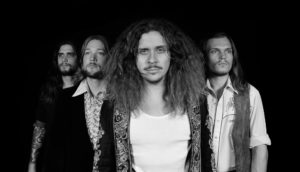 ANTIHERO: What are some of the high and low points of your career? What’s different in music today compared to when you first started?
ANTIHERO: What are some of the high and low points of your career? What’s different in music today compared to when you first started?
Anders Brink: I guess when we first started out, actually there weren’t a lot of retro bands, if you want to call it that.
The first band I started was maybe 12, 13 years ago when I was in my early teens. Back then, there weren’t that many of those kinds of bands, so I’ve kind of done it all along. I’ve always loved this kind of music, so I’ve been playing it all along. Actually, as the years went by, a lot of bands showed up and had a lot of success like Rival Sons and Graveyard and Horisont and stuff like that. So, it’s great to see that there’s a market for it. So, I guess we’re in a pretty good place right now for a band like us.
And high and low points, actually, of course, it’s always hard to be in the business if we should start with the negative stuff because it’s not a very great business anymore financially speaking. You can’t really make any money. I guess everybody knows that. The record labels don’t have any money, so they can’t really do all the things that they used to do for you. So, you have to do a lot of the stuff yourself. Of course, sometimes that’s a lot of work to do promotion and bookings and songwriting and recording, all that kind of stuff.
Generally speaking, it’s not something that bothers us that much. But I guess my view on that is it’s pretty harmful for the quality of music, I guess. I can feel it a little bit sometimes on myself if we have to do all of this work, being your own booker, being your own manager, being your own promoter, everything, it takes a lot of time and that time can really only come from one place and that’s from the songwriting and practicing time. On top of that, if you have to make some money getting a job somewhere else outside of the music business, then of course it’s going to take a lot of your time.
But I guess back in the day when bands were signed, they had all the time in the world just to play music and write songs. I can’t really see how that’s not a harmful thing for the quality of the music. I’m a little afraid that maybe that’s one of the reasons that … How can I say it in a nice way? But the general quality of music today, if you look at the mainstream music, to me, at least, is very, very poor.
ANTIHERO: I don’t care for mainstream music. I agree. I like more independent, underground stuff that most people haven’t heard.
Anders Brink: That’s where the good stuff is at. I agree.
ANTIHERO: Exactly. Stuff that isn’t overplayed on the radio and stuff. It used to be like a song you liked, then it hit the radio, then you hear it like five times every hour. It’s not special anymore.
Anders Brink: You want it for yourself. It’s always funny when you follow a band from the early, early start and then you see them explode. Now they’re not yours anymore. Now they’re everyone’s. I guess that’s how many people.
ANTIHERO: That’s exactly how with Volbeat … When I first heard Volbeat, it was like on their second album. Nobody knew who Volbeat was out here. I was telling people, “Volbeat, Volbeat, Volbeat.” When they toured with Metallica, they came to San Jose, I wanted to see Volbeat, but I didn’t want to pay the big money to watch them pay a half-hour. They had an off-night in LA and they played at the Troubadour. They headlined the Troubadour. That was officially their first ever US headlining date. I flew out there for that show because I wanted to see more than 30 minutes of Volbeat. Then all of a sudden Volbeat blows up. I mean I still like them, but they’re really big now.
Anders Brink: It’s incredible that they’re so big now. It’s amazing. I guess it’s hard for us in Denmark to grasp how huge they’ve gotten because in Denmark, they’ve been pretty big for a long time. It’s kind of the same thing now. They’re kind of just Volbeat, a big rock band. But I guess in the states, especially in Germany, they are huge. So, congratulations to them.
ANTIHERO: I was going to ask you what is your opinion of online music streaming sites such as Spotify and Pandora?
Anders Brink: Yeah, it’s like both good and bad, I guess. The great thing about it, everybody can listen to your music. It’s easy to get access and you can get your music out to the whole world just by putting it out on Spotify. That’s, of course, a very good thing. I must admit it’s a great thing when you just want to check a band out, you just go on Spotify and you listen to it. It’s much easier to get an idea of a band today, I guess. So, of course, that’s a good thing. I guess the whole economical thing about it, I don’t think there’s any way around it anymore.
I don’t think there’s any use of fighting the online music movement because you can’t do anything about it. If you make sites like Spotify illegal, then you’re just going to get a lot of illegal streaming again and get a lot of illegal downloads. There’s no way of stopping it. You can see how it went with Metallica. They tried to shut down … What was it called, that old site? Metallica made like a lawsuit against one of those online download sites.
ANTIHERO: That was Napster.
Anders Brink: Napster, that’s the one. I think that’s just how we need to do it now. Of course, from a financial point of view, it’s pretty crappy. There’s not a lot of money in it, but it’s better than nothing, I guess. I guess the kind of music that we play, people still want to buy records, at least at our shows. They want something. We make a lot of vinyls because that’s kind of like … If you should buy something, it’s great to have a vinyl. So, we are still selling vinyls. Most of all, I just want people to listen to our music, I have to be honest. Then we can make money somewhere else. We just need people to show up at our shows. So, if they want to listen to it on Spotify, that’s great. They should just do that.
ANTIHERO: To tell you the truth, that’s where I found you guys.
Anders Brink: Yeah, exactly.
ANTIHERO: I have Spotify and every Friday, they have new releases. I hit the new releases and go down and I’ll see, “Who’s this?” And I’ll listen to it. It instantly struck a chord there. I know you make like pennies on the dollar, basically, through Spotify, right?
Anders Brink: Yeah, I guess it’s something like that, one penny.
ANTIHERO: But I guess it’s like people who wouldn’t normally have known who you are, like me, they go on there and then they hear you. Then when you come to town, they buy tickets to your shows, they buy merchandise and stuff.
Anders Brink: Exactly. That’s great because if we go back 20 years, how should you ever have found us? That would be impossible. Yeah. We get calls from all over the world, Australia, the states, all over Europe, Asia, Japan. That’s amazing. It’s gone global. That’s, of course, more than you can wish for. There’s good things and there’s bad things, but I guess it’s the right way to go in the future. Then you just have to find a way of dealing with it in the best way possible.
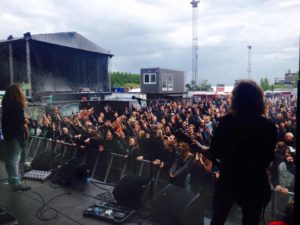 ANTIHERO: So, what are your plans for the rest of the year, touring-wise?
ANTIHERO: So, what are your plans for the rest of the year, touring-wise?
Anders Brink: Starting just after the summer, we are going on a small Danish tour doing a couple of gigs around Denmark. Then in the fall, we’re going to the UK with Tygers of Pan Tang, one of those old new wave of British heavy metal bands. We’re going on tour with them, UK tour in November. That’s exciting. Then we have some stuff coming up in Europe, I think, Germany, especially, as well in October and November. So, that’s a lot of good times coming.
ANTIHERO: Any US dates planned?
Anders Brink: Not yet. We would love to. That’s kind of a big step. That’s a long way over there. We really hope we can go there. Maybe next year, that would be great.
ANTIHERO: I’ve noticed a lot of bands from overseas, a lot of great bands … Half of my favorite bands are all overseas and none of them have ever come out here. Is it expensive to get a working visa? Is that what it is?
Anders Brink: Yeah. You don’t do that. You don’t get a visa. It’s impossible, almost, unless you’re a big band like Volbeat. Of course, this is not for the interview because that’s not legal. But you have to say that you’re going on vacation and stuff like that and kind of pretend that you’re not a band and just sneak in and rent instruments over there so you don’t bring everything. It’s pretty difficult. Yeah. And of course, it’s a long way and it’s a lot of money. It’s a big investment. So, you have to make sure that the shows that you’re playing are of some size because you really need some people to see you when you’re going over there so it’s not for nothing.
ANTIHERO: Yeah. You have to have a following. You don’t want to play a place and nobody’s there. Have you ever played here in the states?
Anders Brink: No, I haven’t played. We went there a couple of years in a row, our bass player and I. That was more like vacation. We went to a lot of shows and saw a lot of stuff in San Francisco and LA and New York. We haven’t played yet.
ANTIHERO: And who would you like to collaborate with? What band or what musician?
Anders Brink: Oh man, a lot of bands. Yeah. There are so many. All of those old amazing singers that have still got a little bit left. That would be great to make some sort of duet with one of those classic gods. I’m amazed by Steven Tyler’s vocal ability and he’s still got it. I saw Aerosmith a couple years back and he sounds better than he’s ever done. And he’s almost 70 years old. I don’t understand how it’s possible, but that’s amazing. Of course, the obvious one would be Volbeat. That would be really cool.
ANTIHERO: That’s very possible.
Anders Brink: Definitely. You have to be realistic. Volbeat actually built their success around a number of duets, here in Denmark, at least. When they broke through, they made a song called “Garden’s Tale” on the second record.
ANTIHERO: One of my favorite songs, yeah.
Anders Brink: With a guy called Johan Olsen, who’s playing in a Danish band, a Danish singer, sings in Danish. But that’s kind of how they really broke through, actually. I remember back then I had just finished high school. I worked a year just in construction to make some money. I listened to the radio all the time. That year, that was the same year that we opened for them in front of 100 people. But that year, just after we opened for them, they started playing that song on the radio. Because that guy, Johan Olsen, was pretty popular in Denmark, they kind of got into the mainstream crowd. That exploded because of that song. It was within two months after they released that, they were just one of the biggest bands in Denmark and they were in rotation at the biggest radio stations alongside all those pop artists and hip-hop artists. It was just hip-hop, pop and Volbeat.
So, that was a very successful duet and collaboration. That’s kind of like a prime example of how well it can go if you collaborate with the right people. They’ve done it a lot of times, actually, Volbeat. They made a lot of duets with the different singers in Denmark. They just did it again, actually. They just made another song on the last record they made. I don’t know if it’s just a Danish single. They made another song with Johan Olsen, the same guy who’s on “Garden’s Tale.” They’re getting a lot of airplay now again with that song. They actually just got a whole festival, a whole show named after them, that song called “For Evigt,” forever. So, it’s a good idea. They’ve done well. I guess it should be an interesting thing to look into, great collaborations.
ANTIHERO: I think Rock the Rebel/Metal the Devil, I think that’s the best Volbeat album. Actually, the song that got me into Volbeat was “Sad Man’s Tongue.”
Anders Brink: Yeah, so heavy.
ANTIHERO: I always envision cranking that song in a convertible with the top down on an open road going like 100 miles per hour. That song is just made for it.
Anders Brink: Yeah. It’s so ballsy. I know. That’s a great way of describing it. I get that feeling a lot, hammering guitar, listening to music, that’s just the best way of getting rid of a lot of energy and a lot of unusable force. That’s awesome. That’s a great song. I agree. That’s the second record, right?
ANTIHERO: Yeah.
Anders Brink: That’s awesome.
ANTIHERO: Is there anything else you’d like to add?
Anders Brink: I hope that we can get our music out more and more in the States as well so we can get an opportunity to get over there and play some shows soon because we would love to. We have some American fans who want to see us. So, I guess especially in the Bay Area and California, I think we’re going to try and go over there as soon as possible.

